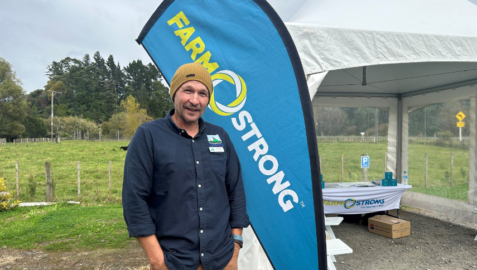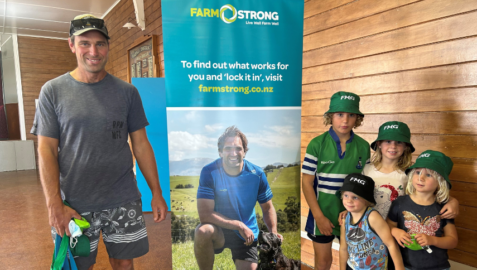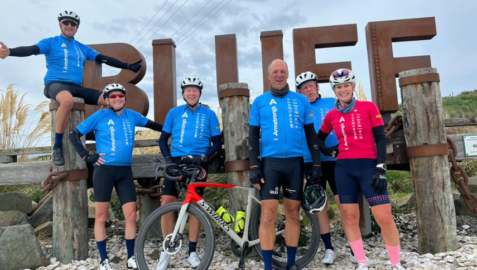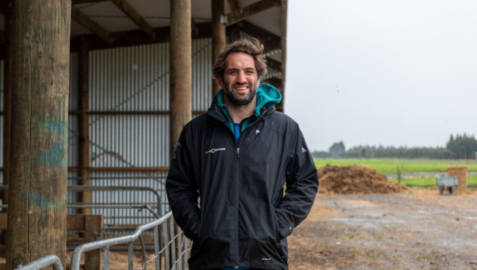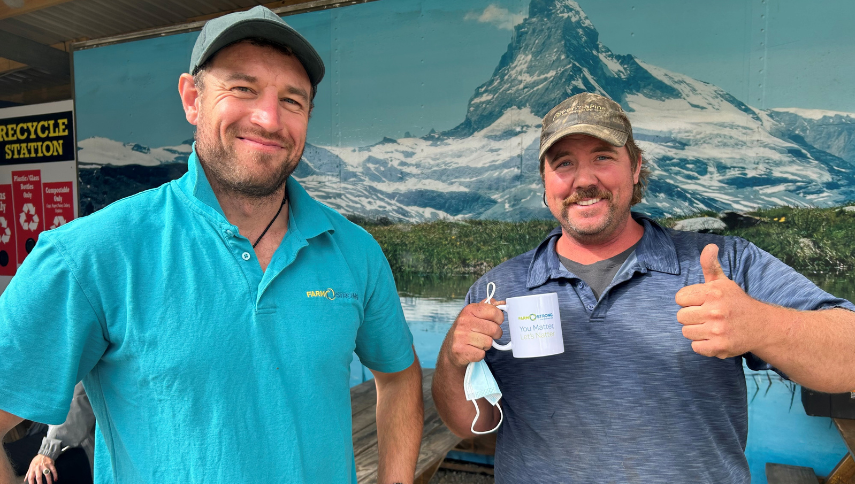
Making time to keep well
Module Overview
Accessing health and wellbeing services can be tricky for people working rurally. That’s why Farmstrong’s teamed up with Taranaki Catchment Communities, Melanoma NZ, Stay Well and Care HQ to offer free health and wellbeing checks for farmers in Taranaki.
The events, sponsored by rural insurer FMG, attracted people from all over the district. One farmer travelled an hour and half to take advantage of the checks. The first event in Uruti saw a steady stream of local farmers, growers and their families pull into popular gathering spot Bratwurst Bros, where free coffee and a ‘brat in a bun’ was on offer for those who stuck around for a chat. The second event took place in south Taranaki at the iconic Oaonui hall, about five minutes’ drive from Opunake.
Local dairy farmer Kane Brisco was there both days representing Farmstrong to remind people of the importance of looking after themselves as well as their stock, land and machinery. Kane’s book, Tools for the Top Paddock, which openly discusses the challenges of farming has been a best seller.
“To be proactive about your physical health is often difficult for farmers. It’s so hard for them to get off farm to get into a GP, so bringing those checks out here to Uriti, which is off the beaten path a little bit, is great,” he says.
“If you ask a farmer ‘what’s the most important thing you’ve got on your farm’, a lot of them will say the animals, the woolshed, the tractor or their working dogs or something like that, but how good are those without you? To stay resilient, you need to get yourself into the frame of mind where you are the biggest cog in the machine. And today is all about looking after that cog. If you oil it, grease it and pay it some love then everything else around you, including the farm, is just going to be work so much better.”
Paul Turner, project lead of Taranaki Catchment Communities, agrees. “Rural communities are very busy, so taking time to get off farm to get into town is often down the priority list. Enabling people to come and have checks around melanoma, glucose, cholesterol and their mental wellbeing is great.”
“Let’s face it, without wellbeing in the community, nothing else matters. If you aren’t in a good space or you’re worried about your mental wellbeing and you don’t know who to talk to, then all the pressures of farming just compound. So, let’s get this base foundation sorted. Once we’ve had morning milking and the chores done, I think we’ll see a good turn out.”
Paul was right, despite the rain and the school holidays, a steady stream of the locals dropped by. Here’s what they had to say.
Farmer Jody Le Bas turned up with her friend Diane Dickson. Jody says, “I like Farmstrong’s advice and the way they offer opportunities to get off farm. There’s no doubt things are a bit more challenging at the moment with things like interest rates and farm expenses rising. You can feel isolated at times in farming. Instead of bottling it all in, it’s good to be able to come along and talk to someone. For anyone doing it tough, Farmstrong provides another option, when maybe people don’t think there are options.”
Local fencing contractor Trent Feather shared how mentally challenging farm work can be at times, despite his 12 years’ experience. “During summer, you’re working by yourself, getting baked all day, then finally autumn hits and things are a little easier, then winter turns up and ‘the blues’ set in. Things don’t happen as fast as they did three months ago, and that’s when things can get on top of you. Suddenly you’re walking along by yourself and the old hamster upstairs is whirring along at a hundred miles an hour and you’re just thinking ‘why am I doing this?’”
Trent says he’s learnt to read the signs. “I can tell nowadays when it’s time to stop for a cuppa because the simple things feel harder and no matter what you touch it all seems to turn to shit,” he laughs. “That’s when it’s time to get the thermos out, take a big, deep breath and reset. And then away you go again. It’s amazing how much easier that makes things.”
We asked Trent why he took time off to drop by. “I’ve got young kids at home. I want to role model to them that it’s important to take care of yourself and be there for the long haul. I think anything Farmstrong can do to help the state of the nation with things like mental health is top notch.”
Christine and Don Munro farm deer, sheep and beef in Tarata and have been farming for 24 years. Don says, ‘The spot checks are something you’ve just got to do these days. We’ve had friends who’ve had bits and pieces chopped out and we’re at that age now. I think it’s great offering these checks otherwise we probably wouldn’t have got it done. We keep on talking about it, but it’s easy to let these things go down the list.”
Further south in Oaonui, dairy farmer Jacques Le Prou shared similar sentiments. “We were heading to Okato anyway, so I thought it’s good to get checked out. You don’t know what’s there and the sun’s pretty unforgiving these days.”
Jacques also shared a few tips about how he stays Farmstrong – scheduling regular downtime and breaks was high on the agenda. “We’ve got grandparents down the South Island and found that a good escape. Once you’re on the ferry there’s no coming back. It’s good to get away because everyone we talk to round here, it’s about farming. Down there you’re not talking about farming.”
“Farming can be a great job if you set it up so you’re not stressed and you can do things like today. You’ve gotta enjoy your farming. If you’re not enjoying it, why do it? Obviously as with anything, there are hard times, but you’ve still got to make the most of it. That’s why I’m out today with the kids taking them to the skate park for a run around.”
Paul Turner reflected on the value of both events. “I’m astounded at how resilient a lot of farmers are, but also I know from the wellbeing workshops we’ve run, that sometimes people ‘put on a face’. It’s as if they have to pretend to be this person that can cope with everything. So having people like Sam Whitelock or Kane Brisco telling people it’s ok to ask for help is inspirational.”
“Let’s face it, if your health or mental health aren’t good, everything else is going to feel overwhelming. Creating a space where people can talk about these issues and understand that they’re not alone and there are people out there who can help is crucial for the future success and sustainability of farming.”
Let’s leave the final word to Taranaki dairy farmer Kane Brisco.
“I think more and more farmers are getting involved with Farmstrong because they are like me – they want to be proactive about their mental and physical health. It is hugely important to being a successful farmer. The resources and knowledge that Farmstrong shares are really simple and easy to understand. Farmstrong’s also set up to help farmers on a massive scale. Last year, over 17,000 farmers improved their wellbeing because of it. To me that’s super cool and that’s what I love to get behind.”
To find out what works for you and ‘lock it in’, visit www.farmstrong.co.nz
